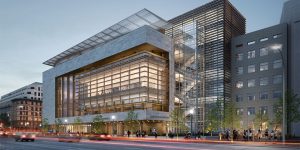Johns Hopkins UniversityEst. 1876
America’s First Research University
Lee Kempler earned his master’s degree from the School of Advanced International Studies (SAIS) in 1991 and has served on the board of advisors for the school since 2005. A senior executive in investment management and a native Baltimorean, Kempler became chair of the board in 2019 and, fairly early in his tenure, had to face the twin challenges of COVID and finding the school’s next dean.
“I’m relieved and gratified we navigated that and came out on the other side,” he says. “Still together, still strong, and ready to move into the next phase.”
The school is about to make a literal move too, into a state-of-the-art facility at 555 Pennsylvania Ave. in Washington, D.C. Learn more about his experience below.

I arrived a couple of months after the Berlin Wall had fallen. And I was studying American foreign policy, which, of course, had been centered for decades around the Cold War. It was an incredibly dynamic time. Everything was up in the air. Our professors used to say that our textbook was The New York Times. My time there also coincided with the early tenure of some of the great SAIS professors, including Michael Mandelbaum, who became a friend and mentor, and Eliot Cohen. So those were very formative years for me.
I would say that being an alum has a lot of benefits and one risk. The risk is that the SAIS that I went to 30 years ago was a very different place than the school today. It’s important I don’t think about priorities or issues that the leadership of the school is facing only through the lens of what I knew when I was there. My job is to focus on the key tenets or principles that are persistent, versus the things that change and are fleeting, and I’m ever conscious of that. The benefits, of course, are that nothing can substitute the emotional attachment I feel to the place and the bonds that I feel with the generation of students to come. It’s why I keep doing this — that sense of emotional attachment and emotional ownership.
It was really, really cool. It was the first chance I had to really get exposure to the rest of Johns Hopkins. Having grown up in Baltimore, everybody assumes that was my Hopkins connection. But I actually found Hopkins through SAIS, after my undergraduate career. So the opportunity, both as a SAIS volunteer leader but also as a Baltimorean, was really interesting and nourishing. Meeting the leaders of the other schools and learning about what Hopkins is doing in the Baltimore community has helped me be a better, more contextually aware volunteer leader for SAIS.
Before chairing the board, I remember being on the finance committee and sitting through discussions about this looming issue. The school’s buildings were old, and they were expensive to maintain. And any fixes we could contemplate would not even be realistic. On the flip side, there was great affection and nostalgia for the school. It was an old house, but it was our old house. Never mind the fact that it was in a spectacular neighborhood, right there by Dupont Circle next to Embassy Row. So when we contemplated maybe moving out to the suburbs to get the space we needed, we wondered if it would be worth it if we weren’t in the center of the Washington foreign policy establishment anymore. It just seemed like an intractable problem.
When it was revealed to the SAIS board that the school had secured a transformative donation to buy the building at 555 Pennsylvania Ave., it was such a gift. It meant that we were going to be able to stay right in the center of the Washington, D.C., action. And it meant that we were going to have this gleaming new facility that will meet the needs for growth and, most importantly, provide a much better student experience. It’s a huge, huge win.
We’re two years into Dean Steinberg’s tenure and his agenda is really taking shape. There are some super exciting things he and the leadership of the school are working on, including the partnership we now have with the Space Force and the role of technology in foreign policy and international relations. Watching how those develop over the next couple of years is something I’m really looking forward to.
Topics: Alumni, Faculty and Staff, School of Advanced International Studies, Strengthening Partnerships, Support Scholars